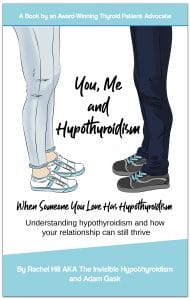Originally published on 24th January 2017 Last updated on 20th March 2019
These days, I don’t often take time off work or cancel plans due to my hypothyroidism and Hashimoto’s. But every now and then, I may need to due to a flare up. In fact, before I was properly medicated for it, I needed a lot of time off work.
There are some things a lot of people don’t realise about me taking days off for autoimmune thyroid disease. Sure, I’m not coughing, being sick or have diarrhoea. But I am unwell and I need to be at home. So trust my judgement.
The Pain
A classic hypothyroid symptom is aches and pains throughout the body, although most common in the legs.
For me, this pain feels like a load of tiny people are lined up against all of my muscles and bones, and banging them with lots of teeny tiny hammers, all at different times but all equally as hard.
Imagine when you’ve had the flu, and the aches and pains you felt with it. I’ve had swine flu and another flu that put me in hospital with pneumonia, yet I’m telling you that hypothyroid aches and pains are worse than the ones I experienced with the flu. The pain is so bad that I find it hard to distract myself from it and often find myself crying without even knowing. It has kept me awake at night and tends to only be soothed with a hot water bottle or bath.
The trouble with that, is that I’m often too fatigued to get myself to the bathroom or kitchen to run a bath or make a hot water bottle. Usually, I have to wait until my husband is home so he can help me up the stairs and get in to the bath safely, as I’ve slipped before when trying to get in unwell.
The Fatigue
Probably the most well-recognised hypothyroid symptom is tiredness. But the word ‘tired’ doesn’t cut it. It’s fatigue. It’s pure exhaustion.
The hypothyroid fatigue many experience leaves them unable to climb stairs. Unable to get to the end of the street. Or even unable to get themselves to the toilet or kitchen to get food.
We’re so tired that we feel nauseous and think we’re going mad.
You’re probably thinking ‘then take a nap’ or ‘have a lie-in’.
Ahhhhh, if only!
The problem with hypothyroidism is that the metabolism slows down due to the lack of thyroid hormone in the body, and with this not only comes weight fluctuations, but also a lack of energy. Because of this, we could nap several times a day, get twelve hours sleep a night and often still feel no better. It’s frustrating. It’s upsetting. It’s even scary.
Especially if you have a job to do, family to run and roof to keep over your head.
The Brain Fog
Lack of thyroid hormone also causes knock-on effects with brain function, which takes us on to another very common symptom; brain fog.
Brain fog is often described as feelings of mental confusion or lack of mental clarity. The phrase comes from the feeling of a fog that reduces your ability to think clearly. It can feel like a mental block. It can cause a person to become forgetful, detached and discouraged.
I’ve had days where I got up at 9am, had breakfast, watched some TV, did some things, then come 12pm, couldn’t remember what I’d done all day.
Thanks to thyroid brain fog, I’ve tried getting in to a neighbour’s house with my front door key and I’ve put laundry in the bin instead of the washing machine. I’ve learnt to laugh about some of it, but it’s still scary.
Brain fog can cause us to have slow reactions, speak slower and muddle up words. Confusion is common.
Another reason why we may be better off not at work during a flare – saying the wrong thing to a customer, mixing up files or inputting figures wrong on the computer can land us and our employer in potentially big trouble.
The Cold Sensitivity
Being easily cold is another common hypothyroid symptom, especially cold hands and feet.
I’ve layered up with four duvets, the central heating and fire on before, and still felt freezing. Therefore, being at work, where it is likely colder than that, also drafty and people wanting air-con on or windows open, can be painful for thyroid patients.
When we’re already so cold, extra coldness can make our bones really ache and affect our concentration since more thyroid hormone is being used to try and generate body heat as oppose to good brain function or energy.
The Mental Health Struggles
Many people with thyroid disease also experience mental health conditions such as depression and anxiety. These alone can be torture to live with, with or without the physical symptoms on top. What might make perfect sense to you, could be difficult for someone with a mental illness, to grasp. Mental illness can make you look at things irrationally and emotions heightened. The slightest thing can make you crumble to pieces.
A day alone with our own thoughts might be what we need. Maybe we can’t even muster getting out of bed today due to the sickness in our stomach called anxiety. Or the impending doom and gloom hanging over us from depression.
Please don’t judge what you don’t experience.
Related post: Thyroid Patients Explain How Their Flare Ups Feel
And You Forget About How We Feel
Do you think we enjoy taking time off work? Do you think anyone who is unwell does? If you’re off work due to vomiting, diarrhoea, flu or a virus, is it fun and enjoyable? Not at all. Wouldn’t you rather be at work feeling well, rather than off work feeling horrible?
So how is that different to someone with a chronic illness or health condition such as thyroid disease?
We don’t like calling in sick. We feel bad and guilty about it. We’re not faking, we’re legitimately very unwell, but society says we shouldn’t be; we should be at work.
Unfortunately, thyroid disease often isn’t as simple to manage as many people think it is, and has the tendency to flare up from time to time. It isn’t always easy to know when it will get worse before it does, either.
Please bear all this is mind, the next time someone you know with hypothyroidism or even any other chronic illness, needs a day at home. We really are trying our best and this isn’t easy to live with.
You can click on the hyperlinks in the above post to learn more and see references to information given.

You, Me and Hypothyroidism: When Someone You Love Has Hypothyroidism, is a book for those who know someone with hypothyroidism.
***
Please remember that if you’re a thyroid patient living with poor mental health or lingering physical symptoms, that you don’t have to live this way. To address why you may still be feeling unwell (often despite being on thyroid medication too), please see this article and go through each suggestion, putting your thyroid jigsaw back together.






8 Comments
Paula Hodson
February 20, 2022 at 11:53 amI have had an underactive thyroid for nearly 23 yrs, I am also disabled having spina bifida, and other medical conditions and I work full time.
The only time I have had a day off work is if I have a upset stomach and this could be due to something I have eaten which is maybe a day older than my stomach can tolerate as I am paralysed from the waist down, I have never associated this with my thyroid – constantly fatigued but still have never taken a day off even if I am anxious or depressed as I can get these symptoms with another one of my conditions as well so just get on with it, I have thyroxine and lansoprazole for my acid reflux they are the only medications I take as my anxiety/depression can go as quick as it comes.
Joanne Desrosiers
July 11, 2021 at 4:16 pmHad one yesterday. After years of feeling guilty for these symptoms I’ve learned to just ride them out. Some Tylenol for the aches and pains, my blanket and a good series to binge watch. No more guilt. Everyone has a cross to bear. This is mine.
Joanna
May 25, 2019 at 12:14 amSuch a helpful read. I’m going through a flare up now: heart palpitations, trouble sleeping, cold all the time and it’s hard to get my doctor to do anything. Do you adjust meds when you have a flare?
Rachel Hill
May 28, 2019 at 12:36 pmAs flares are usually only short term (e.g. from a day to a couple of weeks), no I do not. If you are feeling unwell for a long time and require a med increase, this isn’t really a flare up but more just a slide back in to hypo if you will.
Secret
April 29, 2019 at 6:38 pmSpot on! I have been struggling with this for close to 20 years. It’s a nasty autoimmune disorder.
Cathy Harris
March 30, 2019 at 12:55 pmI am so relieved to know someone else experiences these “flare ups.” I’ve been dismissed by several doctors when I described what I was feeling. “Oh, you must have a virus. . .” They are definitely triggered by stress. My worst experience lasted 10 days, during which I lost 15 pounds. I’m curious if any of the standard thyroid blood tests would show the fluctuation we feel, if they were taken during a flare up?
Rachel Hill
March 30, 2019 at 1:00 pmSorry to hear you experience flare ups too, but glad that you’ve found some reassurance. They are indeed very common among thyroid patients yet no one else seems to talk about it.
I’ve never had my blood levels tested during a flare up so I’m not sure but it’s a very interesting thought.
Kendra Edwards
January 29, 2017 at 5:26 pmI would love to learn more.